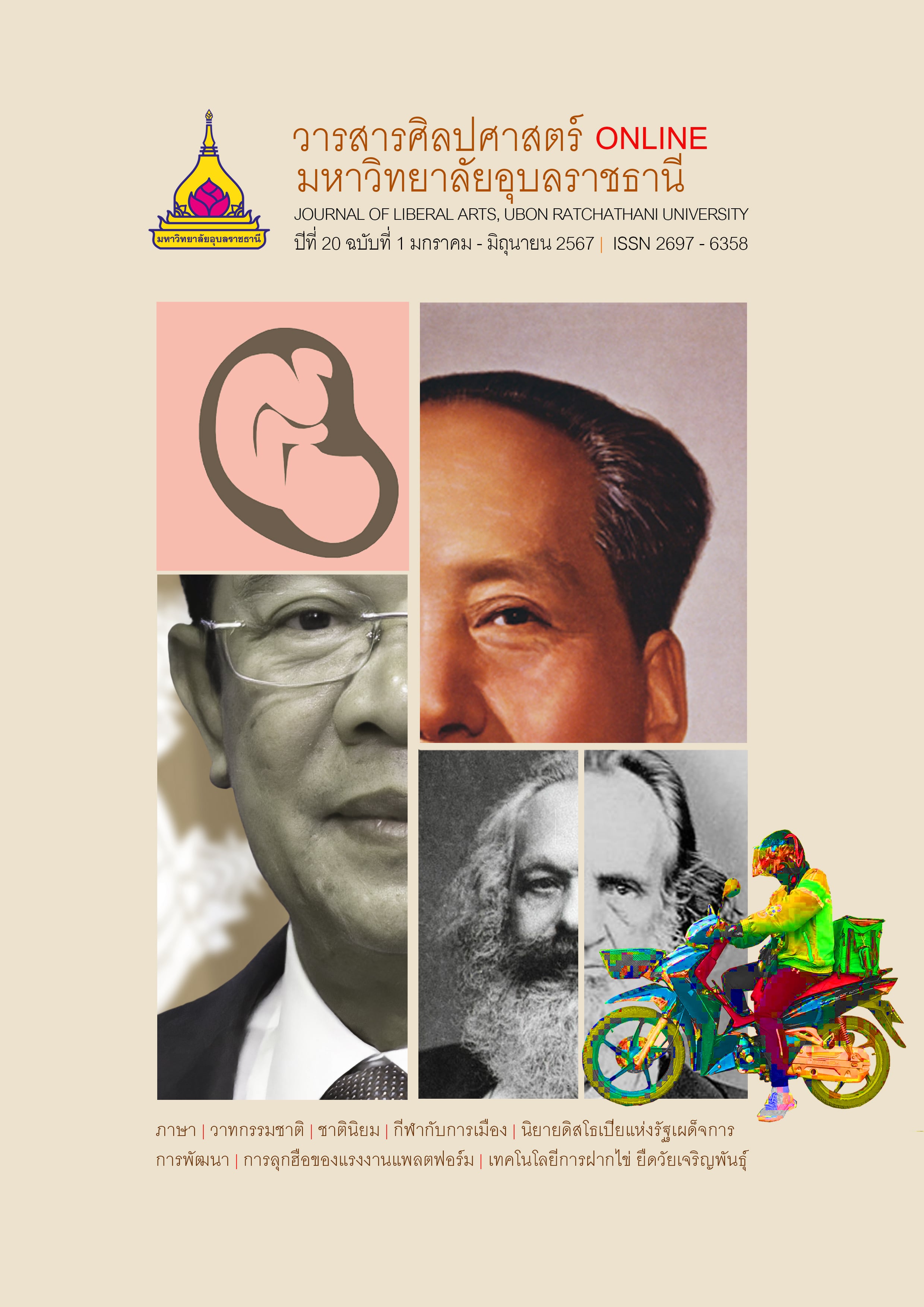เทคโนโลยีการฝากไข่ : ผู้หญิง ร่างกาย และการทำให้เป็นเรื่องชีวการแพทย์
Main Article Content
บทคัดย่อ
งานวิจัยนี้มีวัตถุประสงค์เพื่อศึกษามุมมองผู้หญิงที่ตัดสินใจใช้เทคโนโลยีฝากไข่เพื่อยืดเวลาภาวะการเจริญพันธุ์ของตนเองด้วยหลายเหตุผล และวิเคราะห์บทบาทเทคโนโลยีที่ส่งผลกระทบต่อร่างกาย ตัวตน ชีวิตทางสังคม รวมถึงความเสี่ยงที่เกิดขึ้นในระหว่างกระบวนการฝากไข่ ข้อมูลในงานมาจากการสัมภาษณ์เชิงลึกกลุ่มตัวอย่างจำนวน 2 กลุ่ม ได้แก่ กลุ่มแพทย์ที่มีประสบการณ์ด้านเทคโนโลยีการฝากไข่จำนวน 5 คน และผู้หญิงที่มีประสบการณ์ฝากไข่จำนวน 20 คน และวิเคราะห์ผ่านแนวคิดการทำให้เป็นเรื่องชีวการแพทย์ของวัยเจริญพันธุ์ที่มีอายุมากขึ้น
ผลการศึกษาพบว่า การตัดสินใจฝากไข่ของผู้หญิงเชื่อมโยงกับการพัฒนาเทคโนโลยีช่วยการเจริญพันธุ์ที่ช่วยรักษาภาวะการเจริญพันธุ์ในสตรีรวมถึงปัจจัยต่าง ๆ ทางสังคมวัฒนธรรม การทำงานของเทคโนโลยีมีส่วนจัดการร่างกายผู้หญิงให้คงความสามารถในการมีลูก เป็นเทคนิคอย่างหนึ่งในการสร้างตัวตนและอัตลักษณ์ซึ่งตั้งอยู่บนพื้นฐานวิทยาศาสตร์และเทคโนโลยีตามความปรารถนาของบุคคลและไม่ตายตัว อย่างไรก็ตาม แม้เทคโนโลยีการฝากไข่จะสร้างจินตนาการและมอบความหวังในการใช้ชีวิตทางสังคมแก่ผู้หญิง แต่เทคโนโลยียังสามารถผลิตความเสี่ยงผ่านกระบวนการทางการแพทย์ที่ส่งผลกระทบต่อร่างกายและความรู้สึกของพวกเธอ ยิ่งกว่านั้น การฝากไข่แม้จะสร้างทางเลือกหรือขยายโอกาสแก่ผู้หญิงในการเจริญพันธุ์ และช่วยต่อรองกับความคาดหวังของสังคมเกี่ยวกับการเป็นแม่ของผู้หญิง แต่ทางเลือกที่ว่าอาจไม่ใช่สิ่งที่สะท้อนอำนาจในตัวเองของผู้หญิงทั้งหมด เพราะสุดท้ายแล้วทางเลือกของผู้หญิงยังขึ้นอยู่กับอำนาจทางสังคมและชนชั้นที่มีในสังคมด้วย
Downloads
Article Details

อนุญาตภายใต้เงื่อนไข Creative Commons Attribution-NonCommercial-NoDerivatives 4.0 International License.
เอกสารอ้างอิง
Baldwin, K. (2019). The Biomedicalisation of Reproductive Ageing:
Reproductive Citizenship and the Gendering of Fertility Risk. Health,
Risk & Society, 21 (5‐6), 268–283.
Baldwin, K., Culley,L., Hudson,N. and Mitchell, H. (2014) Reproductive
technology and the life course: Current debates and research in social egg freezing. Human Fertility, 17 (3) , 170-179.
Bozzaro, C. (2018). Is Egg Freezing a Good Response to Socioeconomic
and Cultural Factors that lead Women to postpone Motherhood?. Reprod Biomed Online, 36 (5), 594-603. doi: 10.1016/j.rbmo.2018.01.018. Epub 2018 Feb 23. PMID: 29530402.
Cimadomo, D., Fabozzi,G., Vaiarelli, A., Ubaldi, N., Ubaldi, F.M., and Rienzi, L.
(2018). Impact of Maternal Age on Oocyte and Embryo Competence. Frontiers in Endocrinology, 9 (327), 1-8.
Clarke, A. E., Mamo, L., Fosket, J. R., Fishman, J. R., and Shim, J. K. (Eds.)
(2010). Biomedicalization: Technoscience, health, and illness in the U.S. 1st ed.. Duke University Press Books.
Duangwises, N. (2018). Modern Globalized-Capitalist Biomedicine and.
The Conjured Construction of Human Life and Health. [in Thai].
Journal of Anthropology, 1 (1), 43-82.
Göçmen, I and Kılıç, A. (2017). Egg Freezing Experiences of Women in Turkey:
From the Social Context to the Narratives of Reproductive Ageing and Empowerment. European Journal of Women’s Studies, 25 (2), 168–182.
Harwood, K. (2009). Egg Freezing: a Breakthrough for Reproductive
Autonomy? Bioethics, 23, 39–46.
Hodes-Wertz, B., Druckenmiller, S., Smith, M., and Noyes, N. (2013). What do
Reproductive-age Women who undergo Oocyte Cryopreservation think about the Process as a Means to preserve Fertility?. Fertility and Sterility, 100, 1343–1349.
Inhorn. M.C. (2017). The Egg Freezing Revolution? Gender, Technology,
and Fertility Preservation in the Twenty‐First Century. Retrieved
September 4, 2022, from
https://marciainhorn.com/wp-content/uploads/etrds0428.pdf
Inhorn.M.C., Birenbaum-Carmeli,D., and Patrizio,P. (2017). Medical Egg
Freezing and Cancer Patients’ Hopes: Fertility Preservation at the Intersection of Life and Death. Social Science & Medicine, 195 (December), 25-33.
Jackson, E. (2018). The Ambiguities of ‘Social’ Egg Freezing and the
Challenges of Informed Consent. BioSocieties, 13, 21–40.
Mayers, C., Williams,J. and Lipworth, W. (2018). Conflicted Hope: Social Egg
Freezing and Clinical Conflicts of Interest. Health Sociology Review, 27 (1), 45-59.
Mintzioria, G , V. et al. (2019). Egg Freezing and Late Motherhood. Maturitas, 125 (July), 1-4.
Myers, K.C. and Martin,L.J. (2021) . Freezing Time? The Sociology of Egg
Freezing. Sociology Compass, 15 (1), 1-17.
Penning, G. (2013). Ethical Aspects of Social Egg Freezing. Gynecologie
Obstetrique & Fertilite, 41, 521-523.
Peterson, A. (2015). Hope in Health: The Socio-Politics of Optimism.
London: Palgrave Macmillan.
Perrier, M. (2013) . No Right Time: the Significance of Reproductive Timing for
Younger and Older Mothers’ Moralities. The Sociological Review, 61, 69-87.
Robertson, J.A. (2014). Egg Freezing and Egg Banking: Empowerment and
Alienation in Assisted Reproduction. Journal of Law and the Biosciences, 1 (2), 1–24.
Shaw, D. B. (2008). Technoculture: The Key Concepts (Vol. English ed).
Oxford: Routledge.
Stoop, D., Maes, E., Polyzos, NP., Verheyen, G., Tournaye, H., Nekkebroeck, J.
(2015). Does Oocyte Banking for Anticipated Gamet Exhaustion influence Future Relational and Reproductive Choices? A Follow-up or Bankers and Nonbankers. Human Reproduction, 30 (2), 338–344.
Thailand medical news. (2019). Thailand, The World’s fertility Treatment
Destination. www.thailandmedical.news/news/thailand,-the-world’s-fertility-treatment-destination.
THE STANDARD TEAM. (2020). Egg Freezing' is a Trend for Modern Women
Who can Design their lives as they want and have Children when they are Ready. https://thestandard.co/egg-freezing.
Van de Wiel, L. (2015). Frozen in Anticipation: Eggs for Later. Women's
Studies International Forum, 53 (November–December), 119-128.
Waldby, C. (2015). ‘Banking time’: Egg Freezing and the Negotiation of Future
Fertility. Culture, Health & Sexuality, 17 (4), 470-482.
Interview
A2 (pseud.). Interview. March 22, 2023.
A9 (pseud.). Interview. March 13, 2023.
A12 (pseud.). Interview. April 5, 2023.
A14 (pseud.). Interview. March 21, 2023
A15 (pseud.). Interview. March 23, 2023


